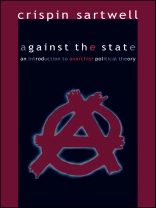Irreverent and incisive critique of liberal theories of the state.
In Against the State, Crispin Sartwell unleashes a quick and brutal rejection of the traditional arguments for state legitimacy. Sartwell considers the classics of Western political philosophy-Hobbes, Locke, Rousseau, Hegel, Hume, Bentham, Rawls, and Habermas, among others-and argues that their positions are not only wrong but also embarrassingly bad. He separates the traditional pro-state arguments into three classes: social contract theories, utilitarian justifications, and justicial views, all while attacking both general strategies and particular formulations. Sartwell argues that the state rests on nothing but deadly force and its accompanying coercion, and that no one is under any obligation to obey the law merely because it is the law. He concludes by articulating a positive vision of an anarchist future, based on the ‘individualism’ of such figures as Emerson and Thoreau. Against the State provides a rigorous and provocative foil to the classic texts, and also serves as a concise statement of the anarchist challenge.
表中的内容
acknowledgments
part I. preliminaries
introduction
1. some definitions
part II. the legitimacy of the state
2. social contract
3. utilitarian justifications of state power
4. justicial justifications of state power
part III. toward something else
5. silhouette of an anarchism
notes
index
关于作者
Crispin Sartwell is Associate Professor of Philosophy at Dickinson College. He is the author of many books, including The Art of Living: Aesthetics of the Ordinary in World Spiritual Traditions; Obscenity, Anarchy, Reality; End of Story: Toward an Annihilation of Language and History; Extreme Virtue: Truth and Leadership in Five Great American Lives; Against the State: An Introduction to Anarchist Political Theory; and How to Escape: Magic, Madness, Beauty, and Cynicism, all published by SUNY Press.












